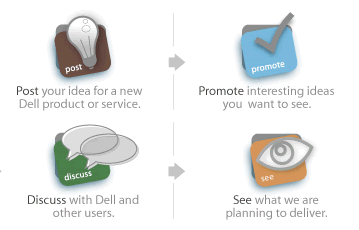I’m a little late in highlighting something Steve “Micro Persuasion” Rubel posted in his blog last week while he ruminated on Robert Cringley’s suggestion that Apple should embed BitTorrent support into the Apple TV box.
However, Cringley raises a heckuva an idea that somebody, most likely not Apple, will pursue. A tandem of services are coming together that will leverage the grid to open TV up as a content distribution channel for the masses. However, this won’t come from Apple at first. The innovation will start with enthusiasts, arising from the edge of the network not the center. Just as it did with PCs and the Internet.
Already all the technology is in place for you to cut your cable and go IP if you wanted to (although you will miss it because of content). Right now it is very kludgy and really only for geeks. Take a small box like a Mac Mini and attach it to your TV – like Dave did. Then throw in a very fast connection, an app like Democracy and a file sharing system that runs off BitTorrent and you have an IPTV that bypasses your cable company.
Democracy for discovery, BitTorrent for distribution, slap some Google advertising on the thing to add revenue, and hey-presto, you’re sticking it to The Media Man. It’s the Broadband Bypass.
Unfortunately, like communism, and using Linux on the desktop, file this idea under “good in theory.” It suffers from focusing on the means of production rather than the real purpose of the whole thing, and it’s a little weird that people still find the idea of p2p for content delivery so enthralling.
Yes, it appears there are still some enthusiasts out there for the idea that “The Grid of Tomorrow” will inevitably replace the one-to-many content distribution architecture of the internet today. While the idea of an IP video network that doesn’t have to worry about the cost of bandwidth both sounds good and is technically feasible I question whether it benefits customers enough to be a serious threat to established media companies.
If I’m Joost or BitTorrent.com, it’s clear that a grid-based content distribution network built on a peer-to-peer network is a great way to bootstrap since you don’t have to worry about provisioning bandwidth for projected peak traffic. In the event of sudden success, scaling out to meet demand doesn’t bother you at all, since the users are providing the infrastructure. Even so, this isn’t enough to guarantee success, it just lowers the costs of failure. This is why Joost and BitTorrent.com are doing everything they can to sign premium content deals for their respective services.
For their part, Viacom’s deal with Joost isn’t about end-running the cable companies or the broadcast networks. They could care less about the bandwidth value proposition offered by Joost’s p2p network. They just want to pursue every outlet possible on their terms (ie, with DRM and a big slice of the revenue model).
As Viacom supremo Philippe Dauman said in a Wall Street Journal article on the deal:
“We’re interested in distribution of our content on as many platforms as possible, provided we can operate in a secure environment,” Viacom Chief Executive Philippe Dauman said in an interview. “This assures any potential partners that we’re open for business and that we’re able to enter into transactions with companies that respect our content and the considerations of our business.”
For Viacom, it’s a chip in the game with Google. They’re signalling that they can do business with a number of partners (Joost, Apple), and they can go it alone, too.
Joost may be getting a lot of heat because they’re building atop a p2p architecture, but that’s merely cheap means to a business end for Joost. They want to be the way people using computers watch TV, and this is the least expensive way for them to get there. Apple has similar ambitions, but they’re a $20 billion/year company with a hardware business; moving to a p2p delivery network wouldn’t make a real difference to them. Both companies, and a few others, have a real chance at becoming the main aggregators of digital content, but the content delivery architecture underpinning their services isn’t the critical factor to their success. Ultimately, it will come down to the strength of the library on offer, and the simplicity of the customer experience.
Source: Micro Persuasion: Grid-Powered IPTV is Coming, But Not from Apple


